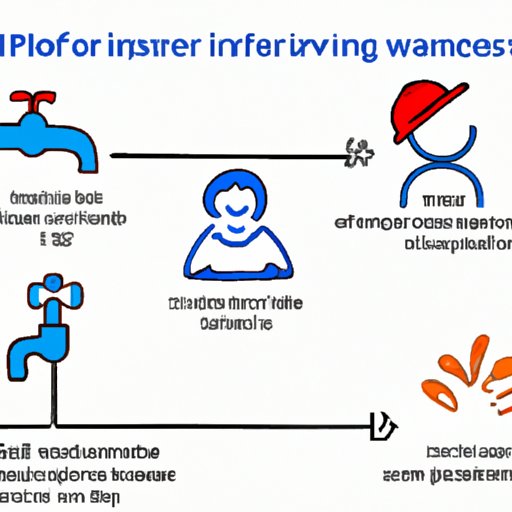
I. Introduction
Choosing the right career path is one of the most important decisions in life. It can be a challenging task to identify the ideal job that matches your personality, interests, and goals. With so many options available, it can be daunting to determine which professions have a promising future, offer job satisfaction, and meet your financial needs. This article explores whether plumbing is a good career choice.
II. 5 Reasons Why Plumbing Could Be Your Dream Career
If you are considering plumbing as a career path, several reasons make it a viable and rewarding option:
Job security and growth opportunities: Plumbing is a stable and resilient industry. As long as people continue to need water and gas supply, pipework, and drainage systems, plumbers will remain in demand. Moreover, the construction industry is constantly growing, offering employment opportunities for skilled plumbers.
High demand and potential for high earnings: Skilled plumbers are in high demand, making it possible to earn significant income. According to the U.S. Bureau of Labor Statistics, the median pay for plumbers, pipefitters, and steamfitters was $55,160 per year in 2020. The highest-paid 10 percent earned more than $98,040 annually.
Flexibility in work schedules: Plumbing jobs offer flexibility in working schedules, with opportunities for full-time, part-time, and even freelance work. Plumbing emergencies can happen at any time of day or night, so plumbers can choose to work weekends, evenings, or early mornings to accommodate clients’ needs.
Variety of job tasks and responsibilities: A plumbing career offers diversity in job tasks, with no two days being the same. Plumbers can work on new installations, repairs, maintenance, and remodels. Plumbing jobs also require different skill sets, ranging from work with water and gas piping, drainage systems, heating, and cooling systems, among others.
III. From Apprentice to Master: The Journey of a Successful Plumber
Education and training are essential for a successful plumbing career. Plumbers are required to complete high school education and attend technical courses that provide knowledge and hands-on experience. Upon completion of courses, apprenticeship is a crucial step that provides an on-the-job learning experience and valuable insights into the plumbing field.
During apprenticeship, aspiring plumbers assist experienced professionals in various tasks, learn how to use different plumbing tools, and understand the plumbing codes, regulations, and standards. The apprenticeship period typically lasts four to five years and requires 144 hours of classroom instruction and 2,000 hours of paid on-the-job training. After completing the apprenticeship program, the apprentices become journeymen plumbers and are eligible for licensure from their state.
The apprenticeship program has several advantages. It offers hands-on experience that supplements classroom knowledge, the opportunity to work alongside professional plumbers, and the chance to get paid while learning. Additionally, apprentices gain a competitive edge in the job market by building contacts and networks within the plumbing industry.
IV. Why Plumbers Are in High Demand and How It Can Benefit Your Career
Plumbers are in high demand due to various reasons:
Increasing construction activities: The growing population necessitates new infrastructural facilities, such as residential and commercial buildings, which requires plumbing installation, maintenance, and repair.
Renovation and remodeling: With homeowners’ desire to improve their living spaces, bathroom, and kitchen remodeling work, plumbing is required to install new fixtures and appliances.
Intricacies of plumbing systems: Modern plumbing systems require sophisticated skills due to technological advancement. The complexity of plumbing facilities creates a need for skilled and trained professionals to install and maintain them.
As demand for plumbers grows, several job opportunities are emerging in the industry, with the residential, commercial, and industrial sectors being the main players. Plumbers can work as self-employed individuals or as part of plumbing firms, with opportunities for growth and promotions.
V. The Pros and Cons of Choosing Plumbing as Your Career Path
Like any career, plumbing has its fair share of advantages and disadvantages. Below are the most notable:
Pros:
- High demand for skilled plumbers
- Potential for high earnings
- Flexibility in working hours
- Opportunities for self-employment
- Diverse job tasks and responsibilities
Cons:
- Physical demands and safety hazards
- Requires practical skills and mathematical ability
- Requires patience and attention to detail
- Business considerations such as customer service and marketing skills
VI. How to Become a Successful Plumber: Tips and Strategies
Becoming a successful plumber requires several critical skills and attributes:
Essential skills: Physical stamina, excellent communication skills, ability to solve problems, attention to detail, and basic math skills.
Education and certification: Completion of high school education, technical courses in plumbing, participating in apprenticeships and achieving licensure.
Effective strategies for success: Effective networking, fostering a positive brand through quality work and customer service, continuing education, and keeping up-to-date with industry trends and regulations.
VII. Is a Plumbing Career Right For You? Factors to Consider
Choosing a career path is a personal decision that requires consideration of various factors, including:
Personality traits: Good plumbers possess traits such as a willingness to learn, attention to detail, an analytical mind, problem-solving skills, and physical stamina.
Personal and financial circumstances: Plumbing as a career will require an investment of time, money, and resources. Aspiring plumbers should evaluate their financial readiness to undertake the education and training required for this profession.
Lifestyle impact: Plumbers who work full-time can expect to work long hours, some of which may be at odd hours. Additionally, plumbing work can be physically demanding and require good physical health.

VIII. The Rewarding Career of a Plumber: Exploring Job Satisfaction and Growth Opportunities
Plumbing is a fulfilling profession that offers a sense of pride in completing essential work that contributes to people’s comfort and safety. Additionally, the industry is continually growing, evolving, and offering new opportunities for advancement. Plumbers can specialize in different areas, such as industrial, commercial, and residential plumbing. For those with entrepreneurial spirit, owning a plumbing business is also a viable option.
The plumbing industry is continually evolving to meet new demands, making it an exciting field to explore. Advancement opportunities are available for skilled workers, such as promotion to supervisory and management roles, or starting your plumbing business.
IX. Conclusion
Plumbing is a viable career path that offers several benefits, including job security, high incomes, flexibility, and diverse job tasks. The journey to becoming a plumber requires education, training, apprenticeship, and licensure. Aspiring plumbers must consider their personality traits, financial readiness, and physical health before choosing this profession. However, the plumbing industry is continually growing, providing new opportunities for advancement and increasing job satisfaction. Choosing plumbing as a career can lead to a fulfilling and rewarding profession.
Call to action: Do you want to explore a plumbing career? Consider researching more about the education and training required and consulting with professionals in the industry.





